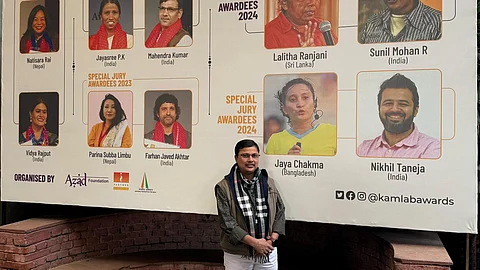

The prestigious Kamla Bhasin Award for Driving Gender Equality Across South Asia was awarded to Sunil Mohan from India and Lalitha Ranjani from Sri Lanka. Special Jury Awards were conferred upon Jaya Chakma of Bangladesh and Nikhil Taneja of India during a ceremony held at the India Habitat Centre, New Delhi, on November 30.
Instituted in memory of feminist icon Kamla Bhasin, the awards recognise individuals who challenge patriarchy and promote gender justice. Jointly organised by Azad Foundation, iPartner India, and the National Foundation for India, the awards include a trophy and a cash prize of Rs 1,00,000 for main awardees and a trophy for Special Jury recipients.
While Jaya and Lalitha won the award in the first category – a woman (cis/trans) practicing Non-Traditional Livelihood, Sunil and Nikhil were recognised under the second category – a man (cis/trans), working towards enabling a gender-just ecosystem.
Sunil Mohan, a transgender man and former captain of Kerala's women's cricket team, has dedicated over 20 years to advocating for gender equity and trans rights in India. Based in Bengaluru, his work spans legal advocacy, crisis intervention, and community-building initiatives that have impacted over 3,000 individuals. Speaking at the event, Mohan shared, “I don’t want others to face the struggles I’ve faced because of my identity. I’m so happy to receive this award. After more than 20 years of work, for the first time, I feel that someone has acknowledged my efforts, someone has truly valued my work.” His initiatives in Bengaluru include legal advocacy, crisis intervention, and plans to establish a queer cafe to promote dialogue and creative expression within the transgender community.
Lalitha Ranjani, recognised for her pioneering work in Sri Lanka’s garment sector, leads the first women-led trade union in the country. Reflecting on her journey, she said, “ I strive to form women’s trade unions at many worksites and establish a federation of unions affiliated with the textile and clothing worker unions in the future.”
Jaya Chakma has broken barriers as a minority woman from Bangladesh, excelling in the male-dominated field of football as a referee and coach. “The main challenge I face even today is the tendency of people not accepting me. However, there is no gender discrimination in my field of work. As a football coach and referee, I can teach both men and women. Being a woman referee doesn’t stop me from showing a red card in a men’s tournament. Receiving the Kamla Bhasin Award feels like earning a degree. And what do people do after receiving a degree? They serve others. This award inspires me and has increased my responsibility to serve people, she said.
Nikhil Taneja, a Mumbai-based mental health advocate, has reached thousands of young men through his show Be A Man, Yaar and campus outreach programs. “I have immense respect for Kamla Bhasin. She made significant contributions to the feminist movement in India, and being associated with an award in her name is both an honour and a responsibility. It is my duty to carry forward this work with other activists so that the next generation of youth can grow up in safe spaces where they do not feel lonely,” he shared.
The awards honour the legacy of Kamla Bhasin (1946–2021), a feminist pioneer and poet who championed women's rights across South Asia. The jury, chaired by Radhika Coomaraswamy, reviewed a diverse pool of candidates from across South Asia, including women with disabilities, trade unionists, and young advocates for gender equality.
The ceremony concluded with a performance by iconic singer Usha Uthup. Next year’s event will be hosted in Nepal by Tewa, Kathmandu.